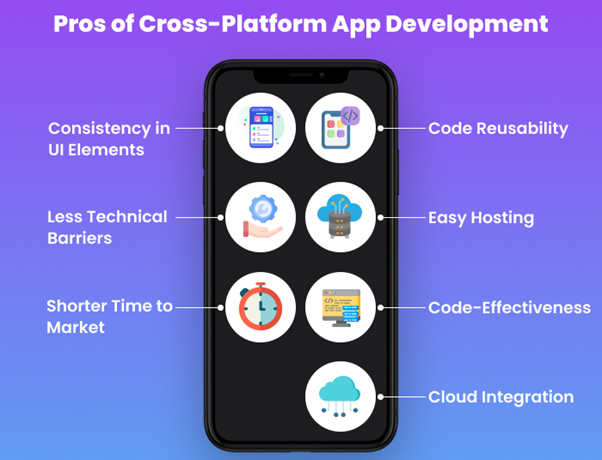Mobile applications have become a necessity for many companies in various industries. These applications must run smoothly on various platforms such as iOS, Android, and Windows. By leveraging the cross-platform mobile development approach, you can build such solutions quickly and cost-effectively.
Let’s talk about the benefits of cross platform application development and discuss the main tools you can use to create cross-platform solutions.
Benefits of Cross-Platform App Development

The Best 5 Mobile Cross Platform Frameworks
The table below summarizes the best mobile cross-platform frameworks for mobile app development, and read on to find granular information on each framework.
| Framework | Programming Language |
| React Native | JavaScript |
| Flutter | Dart |
| Cordova | HTML5, CSS3, JavaScript |
| Ionic | Typescript |
| Xamarin | C## |
Continue reading below to know more about the most popular mobile cross-platform frameworks:
React Native
React Native is a popular Java-based mobile cross-platform framework that can help create natively rendered mobile apps for Android and iOS. This framework can help you create unique applications for multiple platforms with the same code base.
First of all, this framework was launched as an open-source platform in 2015. It has become one of the best solutions used for mobile application development in just a few short years. A growing number of developers are choosing React Native framework for effective application development.
Advantages of Using React Native Framework
1. Allows you to create applications for different platforms Android, Android TV, iOS, macOS, tvOS, Web, Windows and UWP.
2. React Native focuses on the user interface and enables application developers to create a highly responsive interface.
3. It is open source and free because it has a great community to support it and improve it if there is a problem.
Flutter
Flutter is a free and open-source mobile user interface framework backed by Google. You can create native apps via codebase only using Flutter. It means that you can use code to develop applications for both iOS and Android.
Flutter is based on a Dart programming language for development. This language is focused on front-end development and can be used to develop web and mobile applications. As per a leading Flutter app development company, it is built on two main parts:
- A collection of reusable UI components and an SDK.
- A collection of essential tools for application development.
Benefits of Using Flutter
1. The mobile applications created with Flutter are fast and highly efficient. Using Flutter brings more noticeable performance gains compared to other cross-platform application frameworks.
2. Flutter has its own graphics engine (it is unnecessary to create the interface separately for Android and iOS).
3. Dart allows you to write a much more structured program code, which means you can create more complex hierarchical structures and applications.
Cordova
Nitobi developed Cordova, it is an effective mobile application development framework. However, Adobe Systems bought and renamed Nitobi in 2011 and released an open-source version of this framework. This framework helps developers build hybrid iOS and Android apps with HTML5, JavaScript, and CSS3.
This framework extended the features of JavaScript and HTML5 to work with mobile devices more efficiently. However, the applications created are hybrid, which means that these applications are not completely native and are not web-based. However, these applications are packaged as device applications and have access to native device APIs.
Most surprisingly, the combination of hybrid and native code snippets has also been made possible with the Cordova framework.
Pros of Using Cordova Framework
1. Faster application development for various platforms.
2. With Cordova, it has become super easy and straightforward to manage application images for different platforms.
Ionic
It is an open-source SDK for hybrid app development. The original version of this platform was developed in 2013, based on Apache Cordova and AngularJS. However, the recent launch of this platform was redeveloped as a set of web components. You can allow users to use any of their preferred UI frameworks, like React, VU.js, or Angular. The latest version of Ionic also allows users to use iconic components without any user interface.
Advantages of Using Ionic Cross-Platform Framework
1. Knowledge of Angular, HTML, CSS, and JavaScript is all you need to get started developing.
2. There are many ready-to-use user interface components available and easy to use.
3. Many plugins to use native mobile phone functions.
Xamarin
Xamarin is a powerful framework for developing cross-platform applications in the best possible way. C # is used here as a programming language for application development. Xamarin is a different framework than others that use HTML, CSS, and JS as development languages.
It is mainly because this application development framework is based on a single programming language which is C #. The framework also provides a runtime that can work on different mobile platforms such as Android, iOS and Windows. With this framework, you will get an application that looks and feels like a native application.
With Xamarin, you have to write code in C #, which will access all the functions available for native applications.
Benefits of Xamarin Framework
1. Free and open-source framework.
2. Unlike many other cross-platform application development frameworks, Xamarin is quite easy to use because knowing the C # and the .NET environment is sufficient.
3. It has a large community of companies and collaborators.
Final Verdict
We hope you have found the list of best cross-platform application development frameworks, descriptions, and benefits. This article will allow you to choose a technology that suits your needs based on its characteristics and your project’s requirements. However, if you have a complex application development project that demands the latest technical features and complicated animations, we recommend to hire a mobile app development company to proceed.




Thanks for the post, nice information about the top 5 mobile cross-platform frameworks. These tips are very useful for new mobile app, It is indeed a piece of wonderful information.